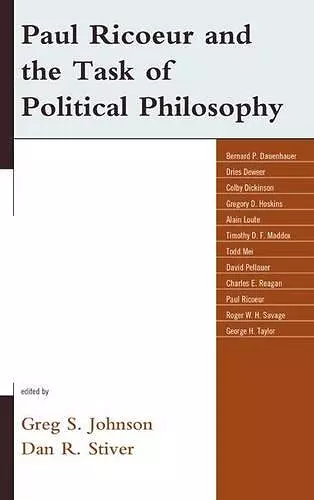Paul Ricoeur and the Task of Political Philosophy
Dan R Stiver editor Greg S Johnson editor
Format:Paperback
Publisher:Lexington Books
Published:13th Oct '14
Currently unavailable, and unfortunately no date known when it will be back

This book discusses the political philosophy of Paul Ricoeur. More precisely, it offers a sustained engagement with Ricoeur’s political thought in a way that demonstrates both the significance of the political in his own thinking throughout his career, and how Ricoeur’s understanding of the political offers something valuable to current discussions in political philosophy. A second goal is to begin to fill a gap in Ricoeur studies and situate his work on political ethics more fully in contemporary discussions about political thought. In this way, Ricoeur can be seen as a figure pertinent to recent trends in political philosophy that make political thinking more realistic to the conditions for political life. The various essays in the book move along intersecting but different trajectories. First, as some of these essays attest, the concept of the political is a pervasive theme that runs throughout Ricoeur’s corpus. In this way a theme throughout the book examines this notion of the political, as well as how it relates to his more well-known work in other areas. Second, and related, the historical understanding of perennial issues in political philosophy are most often updated by those standing in the lineage of those who have come before. As such, Ricoeur’s hermeneutical orientation has moved him to engage contemporaries who attempt to “think forward” in various ways this tradition for current situations. Unlike most who engage in political thought, Ricoeur goes where others dare not, namely, to those who appear to be opponents but, as he shows, offer perspectives worth more consideration in the name of the best of political thinking. In this light, Ricoeur’s hermeneutical orientation is again a unique framework for understanding the nature of political engagement, an orientation in what follows that highlights the ways that Ricoeur and a Ricoeurian perspective cross philosophical orientations to develop a unique understanding of political thought that is different.
These essays highlight the potential of this philosophy to take up today’s political questions, as well as with long-standing political questions which characterize political thought. Commenting dialogs between Ricœur and Kant, H. Arendt, and Agamben and Honneth show philosophical dialog as a method which enables us to think better. Therefore, it is not surprising that Ricœur is used throughout these pages to analyze contemporary stakes, such as capitalism or post-colonialism, nor to discover, beyond the diversity of the topics, that we might find in their unity the political importance of recognition. -- Clifford G. Christians, Ph.D.
Inaugurating the new "Series on Thought of Paul Ricoeur," this excellent edited collection explores aspects of the renowned thinker's political philosophy. Bringing together both the efforts of established scholars and newer ones, editors Johnson and Stiver sculpt an expansive work that systematically applies Ricoeur's interdisciplinary ideas to some of the most pressing issues in contemporary politics. Among the topics probed are citizenship, justice, recognition, judgment, violence, hope, legitimacy, and forgiveness. A piece by Ricoeur himself examines the nexus between the moral, the ethical, and the political. In combination with a biographical sketch that maps the contours of the subject's life and late reflections, it rounds out the volume. Also noteworthy is the introduction, which usefully contextualizes Ricoeur, summarizes the contributions, and highlights the dialogical nature of a voluminous oeuvre that evolved over a 70-year period. From another angle, the volume is a fitting companion to the recently published From Ricoeur to Action, edited by T. S. Mei and D. Lewin (CH, Apr'13, 50-4367)--a thematic collection that surveys the sociopolitical significance of Ricoeur's thinking. If this is a representative sample of what is to come, Ricoeur devotees have much to be thankful for. Summing Up: Highly recommended. * CHOICE *
ISBN: 9781498503549
Dimensions: 226mm x 155mm x 18mm
Weight: 363g
242 pages